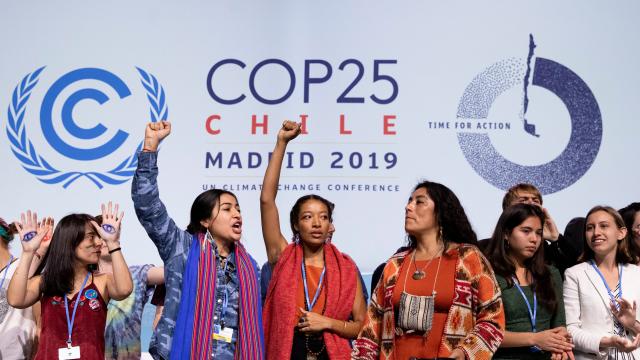On Wednesday, young climate activists rushed the main stage at the United Nations climate talks in Madrid in protest. The talks”dubbed COP25 in UN-speak”are the latest iteration of a 25-year exercise in futility, broken promises, and negligence. And young adults are sick of it.
Carbon emissions have continued to rise to record highs almost every year despite dire warnings. Greta Thunberg urged those gathered at COP25 to listen to the warnings from scientists, but the group of young adults on the stage were a more potent reminder of what those reports say. They’re data incarnate, the people who have to live with the findings in those science reports and the choices we make.
But for anyone who has paid close attention to climate negotiations, there’s another group that’s been carrying the same message for the past two and a half decades. Small island nations have held the line throughout international climate talks, acting as a moral core. Their message has been clear all along: If the world warms past 1.5 degrees Celsius, our future will disappear beneath the rising sea.
This year’s climate talks are the first time both forces have come to bear on the negotiations. And their work both inside and outside the confines of the talks means nobody will able to say they weren’t confronted with the dangers of future inaction.
The central premise of the Paris Agreement is to keep global heating “well below 2 degrees Celsius above pre-industrial levels and pursuing efforts to limit the temperature increase to 1.5 degrees Celsius above pre-industrial levels.” That 1.5 degrees Celsius language wouldn’t be there if it wasn’t for small island states. It’s what Tyrone Hall, an advisor to the Alliance of Small Island States (AOSIS), told Gizmodo was a “conditional victory,” but one that set off a key chain of events that have come to define how the world views climate change in the four years since the Paris talks hammered out that agreement.
“That’s just been turning out to be an epic win, because that report about 1.5 degrees is essentially saying that’s the only goal that an ambitious response to climate change should think of,” he said, referring to the bombshell United Nations report published last October warning of the chaos that awaits if humanity lets the planet heat up past 1.5 degrees Celsius.
For small islands, it’s not just the chaos that’s concerning. It’s the threats to their very existence. The sea-level rise locked in if the world warms past 1.5 degrees Celsius would inundate many low-lying countries and force millions to flee as soon as the middle of this century. Ocean acidification would also spike to levels that would wipe out coral reefs, destroying ecosystems that numerous small island economies rely on for tourism, fishing, and storm surge protection.
Even before the report, these threats were clear, and small islands used moral clarity and the fact that each country gets one vote at negotiations no matter their size to get the 1.5 degree Celsius goal on the world’s mind. And they’ve continued to raise the existential threat they face at international talks.
Last year’s report further raised awareness and also coincided with the rising tide of youth activism. Greta Thunberg’s solitary strike began in August 2018, bloomed into protests at last year’s climate talks and massive strikes around the world this year. In essence, young adults who took over the stage at COP25 have built on AOSIS’ epic win. And they’ve galvanised millions more with their sense of moral urgency.
“We love the energy. We want the energy. We encourage it,” Hall said. “The energy they’re bringing it into the process is healthy. So it’s up to us to mobilize that. One of the key things we have to do is find a way of integrating the perspectives”not just people in the youth movement but young people in general”into our national priorities.”
While both young adults and small island nations have a shared goal of drawing down emissions, there are also distinct differences in priorities after that. Small islands have a microscopic carbon footprint. And in many cases, they also have a finite amount of financial resources to adapt to changes. Hall said securing funding for adaptation as well as funding for loss and damage”a mechanism where rich countries largely responsible for the crisis help pay for damages incurred in developing countries from climate shocks”are top priorities for AOSIS.
Yet they’re issues young adults, particularly those from developed countries, haven’t raised. That’s not to say they’re not supportive”Thunberg has used her platform to lift up indigenous voices and demands“but it shows that the relationship is a work in progress.
But at the dawn of the most important decade in human history, this type of connection between small islands and young adults holds the promise of a realignment of power. Climate talks (and world governments in general) continue to be under the sway of fossil fuel interests, subsidising our demise.
Without a realignment in power and priorities, we’re screwed. Because make no mistake, unchecked climate change will eventually come for all us without the ability to buy a private jet or Cybertruck. Young adults and small islands will just be the first to feel its wrath and live with the impacts the longest.
“Small islands don’t need to be told to be ambitious because, for us, climate change is an emergency that already affects our lives today,” Miguel van der Velden, a 22-year-old climate activist from Aruba, told Earther via WhatsApp message. “But I think that the youth movement will be essential for raising ambition in the Global North.
“I firmly believe that we will not achieve climate justice without working together. Not only must we come together as countries, but also as generations.”
